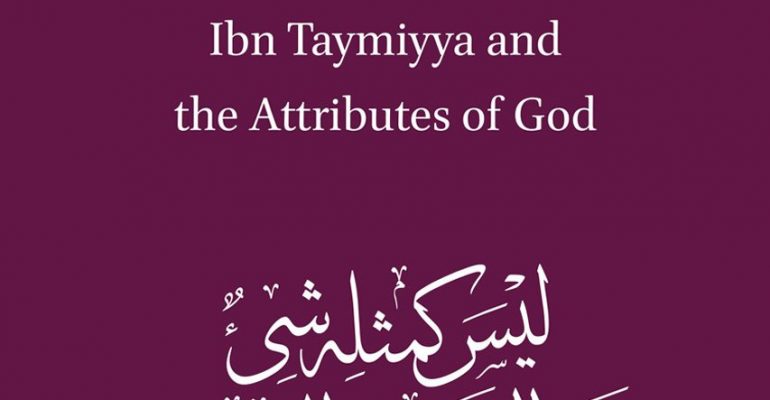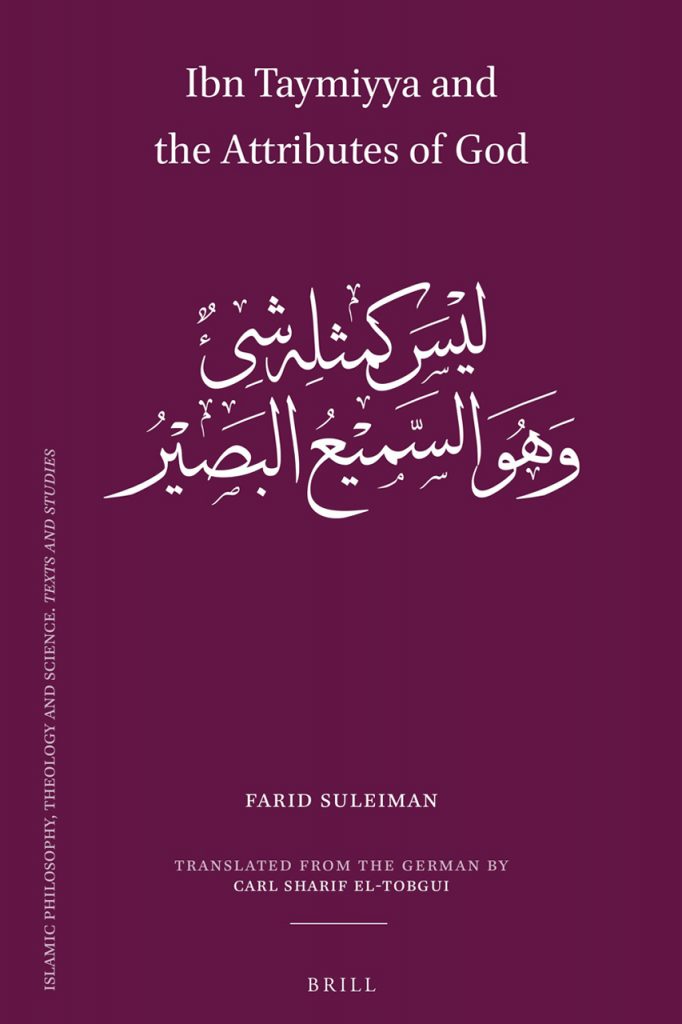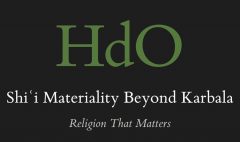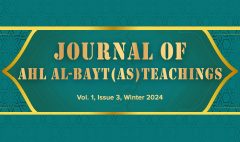Ibn Taymiyya and the Attributes of God
January 1, 2024 2024-01-29 3:40Ibn Taymiyya and the Attributes of God

Ibn Taymiyya and the Attributes of God
Ibn Taymiyya and the Attributes of God
By Farid Suleiman
Translated from the German by Carl Sharif El-Tobgui
Publisher: Brill
Series: Islamic Philosophy, Theology and Science. Texts and Studies, Volume: 125
Publication Date: November 30, 2023
In Ibn Taymiyya and the Attributes of God, Farid Suleiman pieces together, on the basis of statements scattered unsystematically over numerous individual treatises, an overall picture of the methodological foundations of Ibn Taymiyya’s doctrine of the divine attributes. He then examines how Ibn Taymiyya applies these foundational principles as exemplified in his treatment of selected divine attributes. Throughout the book, Suleiman relates Ibn Taymiyya’s positions to the larger context of Islamic intellectual history.
It should be noted that many ideas and teachings of Ibn Taymiyya are not shared by mainstream ideologies and beliefs of other Muslims and they should be considered with caution.
About the Author
Farid Suleiman, PhD (2018), is Lecturer in Islamic Theology at Greifswald University. His current research takes the insights on language gained from Ludwig Wittgenstein as a departure point for shedding new lights on the character and development of Islamic intellectual history.

Table of contents
- Introduction
1.1. State of the Field
1.2. Objectives and Approach
1.3. Overview of the Works of Ibn Taymiyya Most Frequently Used in This Study
Part 1: Ibn Taymiyya’s Biography and the History of the Divine Attributes in Islamic Thought before His Time
- Ibn Taymiyya’s Biography
- The Divine Attributes in Islamic Intellectual History up to the Time of Ibn Taymiyya
3.1. The Emergence of the Debate over the Divine Attributes in Early Islam
3.2. The Muʿtazila
3.3. The Falāsifa
3.4. Ahl al-Ḥadīth
3.5. The Ashʿarīs
Part 2: The Methodological Foundations of Ibn Taymiyya’s Doctrine of the Divine Attributes
- Ontological Foundations
4.1. The Term wujūd: Meaning and Gradations
4.2. Likeness (mithl, tamāthul) and Similarity (shibh, tashābuh, ishtibāh) among Existent Things
4.3. Ibn Taymiyya’s Ontological Conceptualism
4.4. Ibn Taymiyya’s Critique of the Doctrine of the Unity of Being (waḥdat al-wujūd) in Speculative Sufism
- Linguistic Foundations
5.1. The ḥaqīqa–majāz Dichotomy
5.2. On the Semantic Relationship of Homonymous Expressions: Ibn Taymiyya’s Linguistic Counterproposal to the ḥaqīqa–majāz Dichotomy
5.3. What Are the Theological Consequences of Ibn Taymiyya’s Alternative to the ḥaqīqa–majāz Dichotomy?
- Hermeneutical Foundations
6.1. Verse Q. 3:7—Ibn Taymiyya’s Understanding of the Terms muḥkam, mutashābih, and taʾwīl
6.2. Ibn Taymiyya’s Challenge to the Validity of Taʾwīl Majāzī: Attempting to Limit the Scope of Application of the Universal Rule (al-qānūn al-kullī)
3 The Two Principles and the Seven Basic Rules for Interpreting the Divine Attributes
- Epistemological Foundations
7.1. On the Applicability of Qiyās in Theology
7.2. The Epistemic Value of Textual Indicants: Ibn Taymiyya in Debate with al-Rāzī
- Summary
Part 3: The Divine Essence and Attributes in Focus
- Temporally Originating States and Acts (ḥawādith) in the Divine Essence
- Case Studies of Selected Divine Attributes
10.1. al-ʿAdl: God’s Justice
10.2. al-Kalām: God’s Speech
10.3. al-Istiwāʾ: God’s Rising over His Throne
10.4. al-Maʿiyya: God’s “Withness”
- Summary
- Evaluation and Conclusion
Source: Brill









